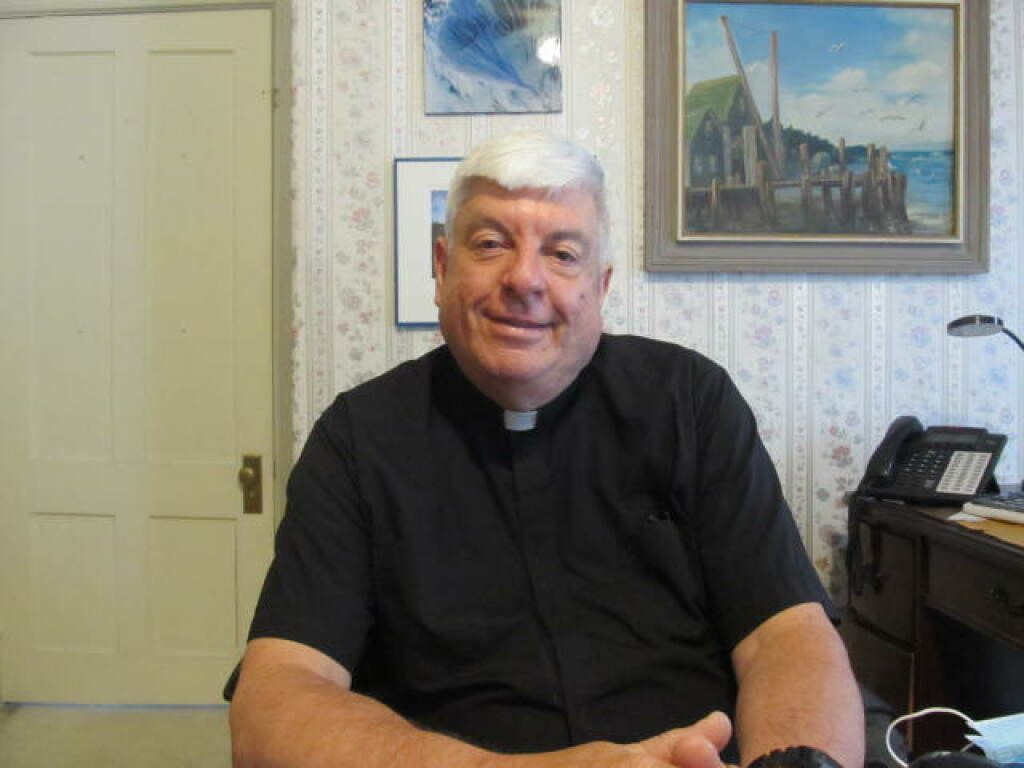 St. Joseph: Model of Tender Love
St. Joseph: Model of Tender Love
Homily for the First Sunday of Lent
February 21, 2021
On the weekends of Lent, we are going to focus on one particular part of the readings, and then relate it to some aspect of Pope Francis’ teaching about St. Joseph—who, as the protector of Jesus and Mary, is also seen as the patron and protector of the universal church.
Let us begin with part of our Responsorial Psalm:
Good and upright is the Lord,
thus he shows sinners the way.
He guides the humble to justice,
and teaches the humble his way.
(Psalm 25:8-9)
Many years ago, during a visit to the Holy Land, I happened to be at the ruins of St. Peter’s house in Capernaum. There were many large blocks of granite, columns of various sizes, and so forth. A little Israeli boy was running about exuberantly, when suddenly he fell and skinned his knee. With tears running down his face, he was yelling, “Abba, Abba…” which is rendered “Father” or “Daddy”—the opening word of the prayer that Jesus taught, the Lord’s Prayer. That is the kind of loving trust that Jesus invites us to have in God—a humble, loving trust that he learned first in his family, from Joseph and Mary.
In a section on Joseph as a “tender and loving father” Pope Francis teaches that “Joseph saw Jesus grow daily “in wisdom and in years and in divine and human favor” (Lk 2:52). As the Lord had done with Israel, so Joseph did with Jesus: he taught him to walk, taking him by the hand; he was for him like a father who raises an infant to his cheeks, bending down to him and feeding him (cf. Hos 11:3-4). In Joseph, Jesus saw the tender love of God: “As a father has compassion for his children, so the Lord has compassion for those who fear him.”
Of course, we must never forget the role of Mary who would have been the first model for Jesus of the motherly side of God. In the many weddings I’ve had over the years, one of the most popular readings is St. Paul’s hymn to love in his first letter to the Corinthians, chapter 13. I found a beautiful “mother’s paraphrase” of that Scripture, reminding us of Mary’s role with Jesus, and indeed, the role of any mother with her child.
Though I speak with the language of educators and psychiatrists and have not love, I am become as blaring brass or a crashing cymbal.
And if I have the gift of planning my child’s future and understanding all the mysteries of the child’s mind and have ample knowledge of teenagers, and though I have all faith in my children, so that I could remove their mountains of doubts and fears and have not love, I am nothing.
And though I bestow all my goods to feed and nourish them properly, and though I give my body to backbreaking housework and have not love, I am nothing.
Love is patient with the naughty child and is kind. Love does not envy when a child wants to move to grandma’s house because “she is nice.”
Love is not anxious to impress a teenager with one’s superior knowledge.
Love has good manners in the home—does not act selfishly or with a martyr complex, is not easily provoked by normal childish actions.
Love does not remember the wrongs of yesterday and love thinks no evil—it gives the child the benefit of the doubt.
Love does not make light of sin in the child’s life (or in her own, either), but rejoices when he or she comes to a knowledge of the truth.
Now abides faith, hope and love—these three are needed in the home. Faith in Jesus Christ, eternal hope for the future of the child, and God’s love shed in our hearts, but the greatest of these is love.
Pope Francis, considering the difficulties and challenges that Joseph and his family faced, concludes: “All too often, we think that God works only through our better parts, yet most of God’s plans are realized in and despite our frailty….The evil one makes us see and condemn our frailty, whereas the Spirit brings it to light with tender love. Tenderness is the best way to touch the frailty within us. Pointing fingers and judging others are frequently signs of an inability to accept our own weakness, our own frailty. Only tender love will save us from the snares of the accuser. That is why it is so important to encounter God’s mercy, especially in the Sacrament of Reconciliation, where we experience his truth and tenderness….We know that God’s truth does not condemn, but instead welcomes, embraces, sustains and forgives us….”
The Holy Father continues, “Even through Joseph’s fears, God’s will, history and plan were at work. Joseph, then, teaches us that faith in God includes believing that God can work even through our fears, our frailties and our weaknesses. Joseph also teaches us that amid the tempests of life, we must never be afraid to let the Lord steer our course. At times, we want to be in complete control, yet God always sees the bigger picture.”
I think, once again, of a delightful story about prayer. Years ago an old lady down south had no money to buy food. But with complete trust in God, she got down on her knees and prayed aloud, “Dear Lord, please send me a side of bacon and a sack of cornmeal.” A scoundrel happened to be passing by, and he heard the lady’s prayer. He decided to play a trick on her. He went and bought a side of bacon and a sack of cornmeal and threw them down the chimney of the old lady’s house. She, of course, was jubilant because the Lord had answered her prayer, and went all around the town proclaiming how the Lord had responded to her. The scoundrel then told everyone what had really happened. The wise old lady quickly replied, “Well the devil may have brought it, but it was the Lord who sent it!” In one way or another she had trusted, and in one way or another God took care of things.
These are the lessons we learn from the life of Joseph and Mary. Mary was asked to be the mother of God’s Son—outside the normal order of things. Joseph was then told in a dream to accept what had happened and to take Mary into his home as his wife. In Bethlehem, things didn’t work out too well, so Joseph had to improvise, and found a stable where the child could be born. The next thing he learns in a dream is that King Herod is out to kill the child, so he should take Jesus and Mary and hide in Egypt. In all these ways, trusting in God and using some ingenuity, Joseph provided for and protected his family. Now Pope Francis reminds us that St. Joseph has a similar role in the Church. If our circumstances are perplexing, if we don’t know exactly which way to turn, if our options seem limited, and if the world seems crazy especially during this time of pandemic, we have someone to whom we can turn in St. Joseph. With tenderness and love he helped salvation to enter our world. If we turn to him, he can help us to hear God’s whispering in our hearts, he can help us to discern the way forward, he can teach us that God can be trusted, and that tender love is always the way.
You might also like
Father's Homilies




